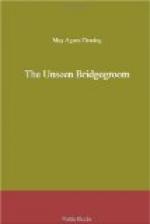“Then she never heard of me?”
“She has never had that misfortune yet; it has been reserved for yourself. You are a rich man, and you will go to K——, and you will see her play, and will take a fancy to her, and adopt her as your daughter. There is the skeleton for you to clothe with flesh.”
“And suppose she refuses?”
“She will not refuse. She likes handsome dresses and jewelry as well as any other little fool of seventeen. You make her the offer, and my word for it, it will be accepted.”
“I will go, Miriam. Upon my word I feel curious to see the witch. Who is she like, Miriam—mamma or me?”
The woman’s eyes flashed fire.
“Not like you, you son of Satan! If she was I would have strangled her in her cradle! Let me go, for the air you breathe chokes me! Dare to disobey at your peril!”
“I will start for K—— to-morrow. She will be here—my adopted daughter—before the week ends.”
“Good! And this old mother of yours, will she be kind to the girl? I won’t have her treated badly, you understand.”
“My mother will do whatever her son wishes. She would be kind to a young gorilla if I said so. Don’t fear for your niece—she will be treated well.”
“Let it be so, or beware! A blood-hound on your track would be less deadly than I! I will be here again, and yet again, to see for myself that you keep your word.”
She strode to the door, opened it, and stood in the illuminated ball. Johnson just had time to vanish from the key-hole and no more. Down the stair-way pealed the wild, melancholy music of a German waltz; from the dining-room came the clink and jingle of silver, and china, and glass. The woman’s haggard face filled with scorn and bitterness as she gave one fleeting, backward glance.
“They say there is a just and avenging Heaven, yet Carl Walraven is master of all this. Wealth, love, and honor for him, and a nameless grave for her; the streets, foul and deadly, for me. The mill of the gods may grind sure, but it grinds fearfully slow—fearfully slow!”
They were the last words Carl Walraven heard her utter. She opened the house door, gathered her threadbare shawl closer around her, and fluttered away in the wild, wet night.
CHAPTER II.
“Cricket.”
The little provincial theater was crowded from pit to dome—long tiers of changing faces and luminous eyes. There was a prevalent odor of stale tobacco, and orange-peel, and bad gas; and there was bustle, and noise, and laughter, and a harsh collection of stringed instruments grinding out the overture.
There were stamps and calls for the tawdry curtain to rise, when a gentleman entered, sauntered up to a front seat, took up a bill and began to read it—a tall, middle-aged, rather distinguished-looking man, black and bearded, with piercing eyes, superfine clothes, and a general aristocratic air about him.




